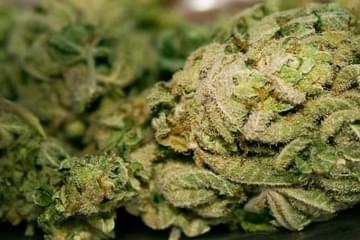
What is Rick Simpson Oil and Is It Effective?
Published on 8/24/19
Updated: March 14, 2022
The Story and Benefits of Rick Simpson Oil
Every so often someone in the marijuana universe comes along, often with some quirky invention or some primo strain, and earns a place in the pantheon of cannabis legends. Jack Herer, Tom Forcade, Brownie Mary, Bob Marley - they're folk heroes who are tangled up in the history of AIDS activism, decolonization, and the gradual cancellation of prohibition and normalization of legalization around the world.
One of those figures is Rick Simpson, whose eponymous 'Rick Simpson Oil' (or RSO) kick-started the mainstreaming of the idea of cannabis as a way to treat cancer. This oil-thick, sticky honey of a cannabis concentrate has also earned its place in the pantheon of top-notch, medically relevant products. Perhaps the first of its kind, many very sick people, pushed to the edge, went desperately to the underground market to get their hands on some Rick Simpson Oil. What's amazing is that many users reported positive effects after using the oil, easing their once debilitating symptoms and helping them live better lives while battling illness, like cancer. Cannabis distillates have grown in the public consciousness as a direct challenger to Big Pharma and much of that began with Rick Simpson.
So with all of that in mind, we here at Where's Weed wanted to highlight the backstory and legend associated with RSO, dig into the science of why it's so helpful for patients, how to make and take the stuff, and where you can get it if you're in a pinch. So without further ado, let's get right into it!
Who was Rick Simpson?

In the late 90s, Rick Simpson was working in a hospital as an engineer in the boiler room. He fell off his ladder one day, hitting his head. He suffered side effects of the accident for years, eventually finding that cannabis helped treat his resulting tinnitus.
In 2003, Simpson was diagnosed with skin cancer. Instead of the doctor-recommended cancer treatment, Simpson concocted an oil made out of cannabis or hemp. That basic recipe would later become known as RSO and it showed real medical potential in easing the size, growth, and pain of the cancer cells in Rick's body. After just a few treatments with his newfound oil concoction, Simpson says the cancer cells in his body had disappeared, all due to the cannabis-derived oil he was ingesting. His doctor disagreed, however, and it is here that the basic schism between Simpson and the medical establishment occurred.
For the next half-decade, Simpson continued producing the oil for medical patients everywhere, trying to spread the benefits of the oil to those who needed it. In Canada at that time, medical patients were able to designate specific growers. This meant that some lucky farmers like Simpson were able to grow fields of the stuff to deliver to patients in need, despite cannabis being widely illegal in every form back then. It also meant that the medical growers were a frequent target of Canadian police and Simpson was no different. In 2009, police raided his east coast crop and put an end to his production of the oil. Since 2013 Simpson has lived somewhere in the Balkans, believing that the semi-autocratic governments there are "backed into a corner" and are perpetually on the verge of legalizing weed. (There's also a thriving drug trade there.)
What is the Oil and How Should You Use it?

At its most basic level, Rick Simpson Oil is just distilled cannabis oil. There are a number of ways to make this (mostly with the same methods and tools that Simpson himself recommends). The problem is though, anyone and everyone making cannabis oil can label it as "Rick Simpson Oil," regardless of its quality or production method, and get the name recognition boost.
Rick Simpson himself has some interesting ideas on the subject of what is and what isn't Rick Simpson Oil. Plenty of people have tried to make a quick buck by passing off something as RSO, so Simpson has a simple message for those wondering what exactly a quality RSO is.
"The only way to know that you have the real thing is to produce the proper oil yourself." If you go to his website, this phrase is repeated over and over again. RSO is less of a single product than a concept or a recipe. It's like Caesar salad dressing or the Cobb salad they're ideas that people make but they both started with someone or somewhere very specific. Everything else is just copying off of the original.
How to Make Rick Simpson Oil
The basic gist of the recipe is to take about a pound of plant matter and soak it in isopropyl alcohol, stirring it for a few minutes. After this, you strain the mixture and then boil the substance in a rice cooker until it thickens up into a honey-like consistency. A pound of plant matter (the recommended way is to use all of the cannabis plant, not just the buds that you'd smoke) will give you 60 grams of RSO, which is enough for a 90-day treatment cycle. The production of RSO requires a little bit of space and equipment but most of all it requires keen attention to safety. Since you are working with heat and flammable alcohol, it is imperative that if you're hoping to make RSO you do so outside or in a well-ventilated area.
It cannot be stressed enough that you read (and follow) Simpson's own instructions on how to make the oil. He's the OG after all. Everyone who replicates the recipe is just apeing off of his original idea. Simpson created a 2,600-word essay on the production of RSO, including thoughts on how to take the medicine, how to use it in conjunction with other things, and how to pace yourself when it comes to your own medication. If someone ever puts together a cannabis bible, Simpson's instructions will be a foundational document and essential cornerstone of the text.
How do I take RSO and what can it be used for?

The canonical use for RSO is for cancer treatment. It is important to declare here that this website is not an official source for medical advice and that the science is not definitive on what, if any, effect RSO can have on cancer. But many patients have used it and experienced success in treating a number of cancers.
There are lots of other conditions that RSO is said to aid in the treatment of. Many of these are the same conditions that cannabis can benefit things like inflammation, multiple sclerosis, anxiety, insomnia, and many others. One of the most touted benefits of RSO is its versatility: many claims it can be used for virtually anything. The basic idea is whatever ails you, RSO can help.
Simpson personally recommends that the oil be used by dropping it under your tongue out of a syringe. Patients are advised to graduate up to the full desired amount. Since it is, after all, a cannabis product, the side effect of getting stoned is to be expected. There are no definitive guidelines on how often to take it but Simpson himself says: "I suggest that people start with three doses per day, about the size of a half a grain of short grained dry rice. The patient should take this dosage every 8 hours, early in the morning, then again in the afternoon, and then they should take their final dose of the day, about an hour before bedtime."
Once you gradually work up to about 1 mL of the oil per day, most patients hold it there and continue to take it for around 90 days.
"Usually, within an hour or so after taking a dose, the oil is telling you to lay down and relax," writes Simpson. "Don't try to fight the oil's sleepy effects, just lay down and get comfortable, then allow the oil to give you the rest and relaxation you require to heal properly."
The Bottom Line
Treating illnesses, especially chronic, incurable illnesses like cancer, can be a tricky and demoralizing business. Any treatment that gives some kind of relief to those suffering from illness is vital in the current legal weed space. Anything that relieves suffering has a place in the modern legal cannabis space, especially one that has proven results for those with cancer. Whatever the case, it's clear that RSO has a place in the wider legal cannabis space.
Have you tried RSO before? What was your experience? Share in the comments below!

















